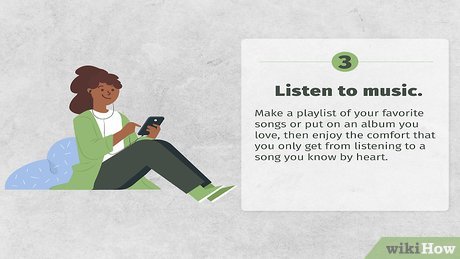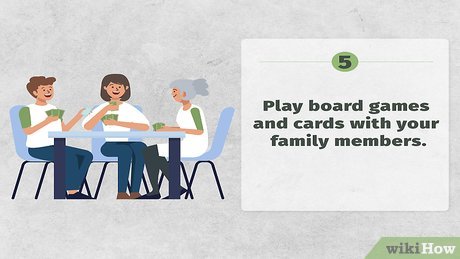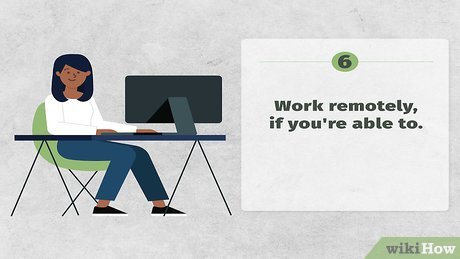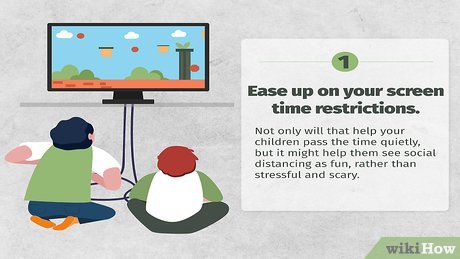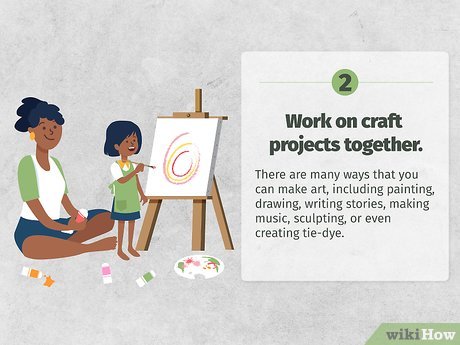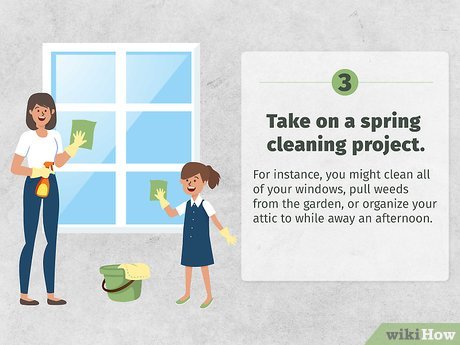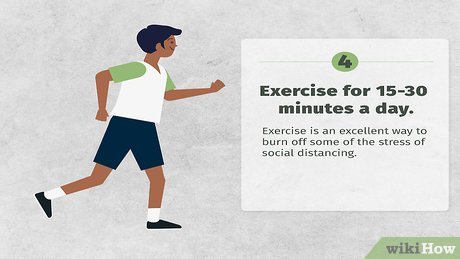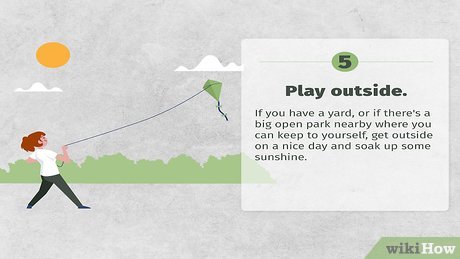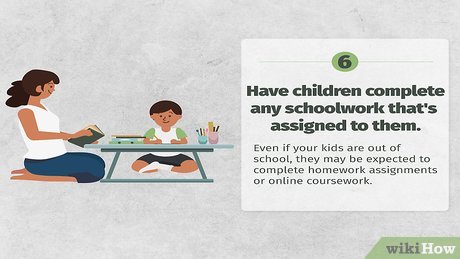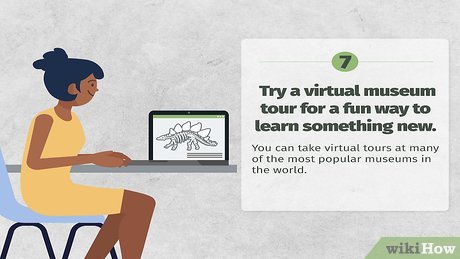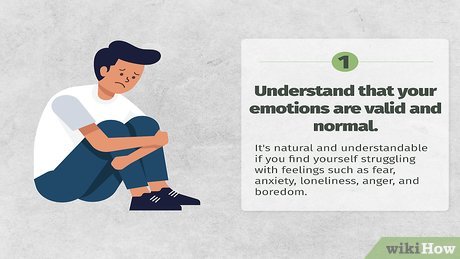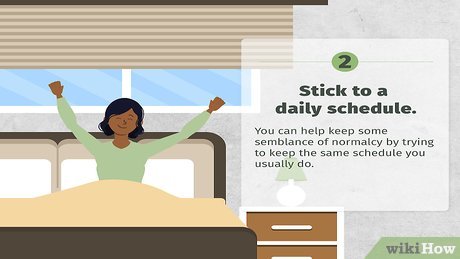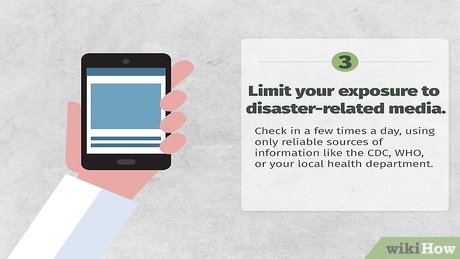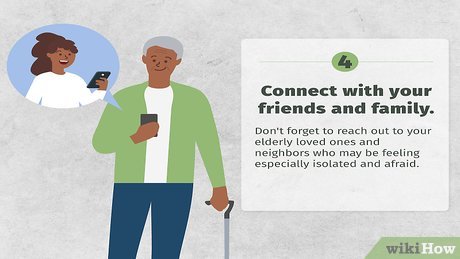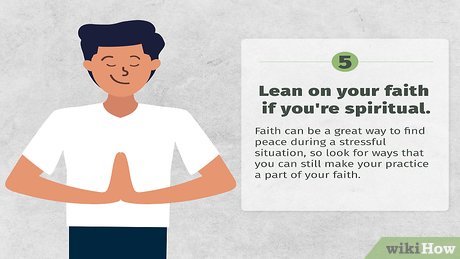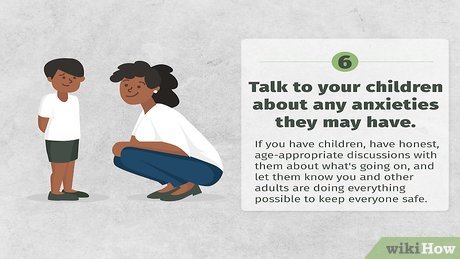How to Avoid Boredom While Social Distancing
Method 1 of 3:
Occupying Quiet Time
-
 Binge-watch a new show or put on a movie marathon. If you find yourself staying at home for a while, you'll probably rely on the TV for a lot of your entertainment. To avoid flipping through the channels mindlessly, check out a streaming app that offers full seasons of various shows, or find a movie franchise that you've been meaning to get into. Just be sure to take regular breaks to stretch and rest your eyes.[1]
Binge-watch a new show or put on a movie marathon. If you find yourself staying at home for a while, you'll probably rely on the TV for a lot of your entertainment. To avoid flipping through the channels mindlessly, check out a streaming app that offers full seasons of various shows, or find a movie franchise that you've been meaning to get into. Just be sure to take regular breaks to stretch and rest your eyes.[1]- If you don't already have a streaming app, check to see if any are offering free trials. That way, you'll have at least a few days' worth of entertainment at your fingertips, but you won't have to pay anything if you cancel before the trial is over.
-
 Get lost in something to read. Reading can make time seem like it just disappears—a welcome relief if you're social distancing. Find something that draws you in, whether that's a romance novel, a thriller, a fashion magazine, or even a paper from an expert in your field. As long as it entertains you, there's no wrong answer![2]
Get lost in something to read. Reading can make time seem like it just disappears—a welcome relief if you're social distancing. Find something that draws you in, whether that's a romance novel, a thriller, a fashion magazine, or even a paper from an expert in your field. As long as it entertains you, there's no wrong answer![2]- Listening to an audiobook can be a great way to pass some time if you want to keep your hands free to do something else!
- If you have a library card, check out an online app like hoopla that allows you to access digital books, audiobooks, and other free content.
-
 Listen to music. Make a playlist of your favorite songs or put on an album you love, then enjoy the comfort that you only get from listening to a song you know by heart. Not only will this help pass a little time, but a familiar song can make you feel a little less alone, even if you live by yourself.[3]
Listen to music. Make a playlist of your favorite songs or put on an album you love, then enjoy the comfort that you only get from listening to a song you know by heart. Not only will this help pass a little time, but a familiar song can make you feel a little less alone, even if you live by yourself.[3]- Listen to whatever you love. Depending on your personality, you might find comfort in a beautiful classical composition, an upbeat pop song, or raucous hip-hop or punk music!
- If there are other people in your home, you can either all take turns picking songs, or have everyone put on headphones if you can't agree on what to listen to.
-
 Solve puzzles to keep your mind sharp. Puzzles are a great way to keep your critical thinking skills engaged, even if you end up not working or doing schoolwork for a while. For instance, you might download a crossword puzzle app, buy a Sudoku book, or put together a particularly challenging jigsaw puzzle if you have the space for it.[4]
Solve puzzles to keep your mind sharp. Puzzles are a great way to keep your critical thinking skills engaged, even if you end up not working or doing schoolwork for a while. For instance, you might download a crossword puzzle app, buy a Sudoku book, or put together a particularly challenging jigsaw puzzle if you have the space for it.[4]Tip: During social distancing, it's fine to order packages online, so even if you don't have jigsaw puzzles or board games on hand, you can have some delivered in just a few days. You'll probably be super excited to have something new to do by the time the package arrives!
-
 Play board games and cards with your family members. A little light-hearted competition can be a fun way to pass some time, so break out your old favorites like Risk, Rummy, Monopoly, and Candy Land. Just remember not to take the games too seriously—you'll still be in close quarters with your family members for a while, so don't gloat too much if you win, and don't take it too badly if you lose.[5]
Play board games and cards with your family members. A little light-hearted competition can be a fun way to pass some time, so break out your old favorites like Risk, Rummy, Monopoly, and Candy Land. Just remember not to take the games too seriously—you'll still be in close quarters with your family members for a while, so don't gloat too much if you win, and don't take it too badly if you lose.[5]- If your family can handle higher stakes without arguing, make the games a little more interesting by adding wagers. For instance, whoever loses may have to make everyone's bed the next morning, or the winner gets to pick the movie for that night.
-
 Work remotely, if you're able to. If you do any work from the computer, ask your boss if you can put in some hours from home. Social distancing can sound like a fun excuse to get out of work for a while, but once boredom starts to set in, you'll probably start to miss your daily work routine.[6]
Work remotely, if you're able to. If you do any work from the computer, ask your boss if you can put in some hours from home. Social distancing can sound like a fun excuse to get out of work for a while, but once boredom starts to set in, you'll probably start to miss your daily work routine.[6]- In addition to helping you pass some time, working remotely may help to ease some of your anxiety about the financial impact of social distancing.
Method 2 of 3:
Finding Family-Friendly Activities
-
 Ease up on your screen time restrictions. While you normally don't want to let kids have unlimited time on their tablets or video game consoles, if they'll be out of school for a while, it's probably a good idea to be a little more relaxed about the rules. Not only will that help your children pass the time quietly, but it might help them see social distancing as fun, rather than stressful and scary.[7]
Ease up on your screen time restrictions. While you normally don't want to let kids have unlimited time on their tablets or video game consoles, if they'll be out of school for a while, it's probably a good idea to be a little more relaxed about the rules. Not only will that help your children pass the time quietly, but it might help them see social distancing as fun, rather than stressful and scary.[7]- Try downloading fun, educational apps like ABCmouse to help younger children learn reading and math skills, or Duolingo to help older students learn a new language.[8]
- Keep in mind that some apps will require a subscription, but you may also be able to find free apps or some with free trials.
-
 Work on craft projects together. Creating art is a fun way to pass the time for people of all ages. Even better, it can help you find a creative way to express some of the emotions that you might be experiencing during a stressful situation like an illness outbreak. And don't be afraid to get messy, since you'll have plenty of time for cleanup.[9]
Work on craft projects together. Creating art is a fun way to pass the time for people of all ages. Even better, it can help you find a creative way to express some of the emotions that you might be experiencing during a stressful situation like an illness outbreak. And don't be afraid to get messy, since you'll have plenty of time for cleanup.[9]- There are tons of ways that you can make art, including painting, drawing, writing stories, making music, sculpting, or even creating tie-dye!
-
 Take on a spring cleaning project. While cleaning might not seem like the most fun way to spend your time, it can actually be very good for you mentally. If you have children, get them involved, too—seeing a project through to the end can give them a sense of purpose and accomplishment.[10]
Take on a spring cleaning project. While cleaning might not seem like the most fun way to spend your time, it can actually be very good for you mentally. If you have children, get them involved, too—seeing a project through to the end can give them a sense of purpose and accomplishment.[10]- For instance, you might clean all of your windows, pull weeds from the garden, or organize your attic to while away an afternoon.
-
 Exercise for 15-30 minutes a day. Getting plenty of physical activity is as important as your mind as it is for your body, so if you're able, try to spend some time every day exercising, and encourage everyone in your home to do the same. That might be as simple as kicking a ball around outside if you're able to go out, or you could have a quick dance party inside if you need to stay in.[11]
Exercise for 15-30 minutes a day. Getting plenty of physical activity is as important as your mind as it is for your body, so if you're able, try to spend some time every day exercising, and encourage everyone in your home to do the same. That might be as simple as kicking a ball around outside if you're able to go out, or you could have a quick dance party inside if you need to stay in.[11]- Exercise is an excellent way to burn off some of the stress of social distancing.
- In addition to getting your heart rate up, make sure you're also getting up and stretching regularly throughout your day to improve your circulation, even while you're relaxing.
-
 Play outside. Social distancing doesn't necessarily mean you have to stay indoors, especially if no one in your home is sick. If you have a yard, or if there's a big open park nearby where you can keep to yourself, get outside on a nice day and soak up some sunshine.[12]
Play outside. Social distancing doesn't necessarily mean you have to stay indoors, especially if no one in your home is sick. If you have a yard, or if there's a big open park nearby where you can keep to yourself, get outside on a nice day and soak up some sunshine.[12]- You might also try packing a picnic and heading out for a hike on a nearby nature trail. Even if there are other people hiking, there should be plenty of open space for everyone to keep to themselves. However, be sure to wash or sanitize your hands if you visit any common areas like picnic tables, public restrooms, or park benches.
-
 Have children complete any schoolwork that's assigned to them. Even if your kids are out of school, they may be expected to complete homework assignments or online coursework. If that's the case, set aside a certain time each day dedicated to schoolwork, and be available in case your kids have any questions about what they're working on.[13]
Have children complete any schoolwork that's assigned to them. Even if your kids are out of school, they may be expected to complete homework assignments or online coursework. If that's the case, set aside a certain time each day dedicated to schoolwork, and be available in case your kids have any questions about what they're working on.[13]- However, since social distancing can be stressful, if your child starts to seem overwhelmed by their work, let them know it's fine to take a break and come back to it later.
-
 Try a virtual museum tour for a fun way to learn something new. Just because school is out doesn't mean you can't learn something new as a family! While many museums may be closed to the public during social distancing, you can still take virtual tours at many of the most popular museums in the world. Pull a tour up on the biggest screen you have, then pick an exhibit and take your time perusing it, just like you would in real life! For instance:[14]
Try a virtual museum tour for a fun way to learn something new. Just because school is out doesn't mean you can't learn something new as a family! While many museums may be closed to the public during social distancing, you can still take virtual tours at many of the most popular museums in the world. Pull a tour up on the biggest screen you have, then pick an exhibit and take your time perusing it, just like you would in real life! For instance:[14]- To tour the Smithsonian Museum of Natural History, visit https://naturalhistory2.si.edu/vt3/NMNH/.
- To see the Guggenheim, go to https://artsandculture.google.com/streetview/solomon-r-guggenheim-museum-interior-streetview/jAHfbv3JGM2KaQ?hl=en&sv_lng=-73.95902634325634&sv_lat=40.78285751667664&sv_h=322.3936462402344&sv_p=-0.9779434204101562&sv_pid=MfnUmHRyOSzMtY3vtYU05g&sv_z=2.0155363993691093.
- If you've always wanted to see The Louvre, click on https://www.louvre.fr/en/visites-en-ligne#tabs.
Tip: You can also find interesting live feeds from around the world, like webcams that stream from zoo enclosures!
Method 3 of 3:
Relieving Stress and Loneliness
-
 Understand that your emotions are valid and normal. In the event of a stressful situation like a widespread epidemic, it's natural and understandable if you find yourself struggling with feelings such as fear, anxiety, loneliness, anger, and boredom. Give yourself permission to experience these emotions. However, don't allow them to control you—acknowledge the feelings, then do your best to release them.[15]
Understand that your emotions are valid and normal. In the event of a stressful situation like a widespread epidemic, it's natural and understandable if you find yourself struggling with feelings such as fear, anxiety, loneliness, anger, and boredom. Give yourself permission to experience these emotions. However, don't allow them to control you—acknowledge the feelings, then do your best to release them.[15]- Try to focus on what you can control in your situation, like staying home to ensure you and others stay healthy. Be proud of yourself for taking steps to help minimize the impact of a major illness.[16]
- If your feelings of anxiety or fear are interfering with your ability to function, try using an online counseling service so you can talk to a professional therapist without leaving your home.
- In the US, you can also call SAMHSA's Disaster Distress Helpline at 1-800-985-5990, or text TalkWithUs to 66746.[17]
-
 Stick to a daily schedule. Your routine might be different than normal when you're practicing social distancing, and that's understandable. However, you can help keep some semblance of normalcy by trying to keep the same schedule you usually do.[18]
Stick to a daily schedule. Your routine might be different than normal when you're practicing social distancing, and that's understandable. However, you can help keep some semblance of normalcy by trying to keep the same schedule you usually do.[18]- For instance, if you wake up and go to bed at the same time you normally would, it will be much easier to readjust when you go back to work or school.
- Keep normal meal times, as well, and try to create a routine for things like exercise and schoolwork.
-
 Limit your exposure to disaster-related media. While it's important to stay informed during times of crisis, it's equally important not to overwhelm yourself with constant coverage. Check in a few times a day, using only reliable sources of information like the CDC, WHO, or your local health department. Then, turn your attention to something else.[19]
Limit your exposure to disaster-related media. While it's important to stay informed during times of crisis, it's equally important not to overwhelm yourself with constant coverage. Check in a few times a day, using only reliable sources of information like the CDC, WHO, or your local health department. Then, turn your attention to something else.[19]- Especially avoid watching 24-hour news coverage for prolonged periods of time. They have to keep broadcasting even if there's not really any new information, and it can become overwhelming if you leave it on for too long.
- Be especially mindful of how much coverage you have on around small children who may not be able to understand everything that's going on.
-
 Connect with your friends and family. Social distancing can lead to feelings of isolation, especially as the days wear on. To avoid that, try to reach out at least once a day to your loved ones. You can do that through social media, text messaging, phone calls, or video chat—anything to keep from feeling like you're alone for days on end.[20]
Connect with your friends and family. Social distancing can lead to feelings of isolation, especially as the days wear on. To avoid that, try to reach out at least once a day to your loved ones. You can do that through social media, text messaging, phone calls, or video chat—anything to keep from feeling like you're alone for days on end.[20]- Don't forget to reach out to your elderly loved ones and neighbors who may be feeling especially isolated and afraid.
-
 Lean on your faith if you're spiritual. If you regularly attend religious services, social distancing may make you feel particularly isolated from your faith. However, that faith can be a great way to find peace during a stressful situation, so look for ways that you can still make your practice a part of your faith.[21]
Lean on your faith if you're spiritual. If you regularly attend religious services, social distancing may make you feel particularly isolated from your faith. However, that faith can be a great way to find peace during a stressful situation, so look for ways that you can still make your practice a part of your faith.[21]- For example, you might pray, read your religious texts, meditate, observe dietary guidelines, or live-stream religious services.
-
 Talk to your children about any anxieties they may have. Even very young children may be aware that things are different around them. If you have children, have honest, age-appropriate discussions with them about what's going on, and let them know you and other adults are doing everything possible to keep everyone safe. Then, let them talk about their concerns. Also, keep in mind that your children will be looking to you for how to react, so try to stay calm.[22]
Talk to your children about any anxieties they may have. Even very young children may be aware that things are different around them. If you have children, have honest, age-appropriate discussions with them about what's going on, and let them know you and other adults are doing everything possible to keep everyone safe. Then, let them talk about their concerns. Also, keep in mind that your children will be looking to you for how to react, so try to stay calm.[22]- For instance, you might tell a younger child, "There are some germs right now that are making people sick. We're staying home to make sure we don't get them or give them to anyone else. But even if we get sick, I'll take good care of you and we'll be just fine."
- If you have older children, give them factual, accurate information about why you're social distancing. If they feel like they're informed, it may help give them a sense of control, lessening their anxiety.
- Go over things your kids can do to stay safe, like talking to them about proper hand-washing procedures and the importance of not touching their eyes, nose, or mouth.
Share by
Kareem Winters
Update 27 March 2020


